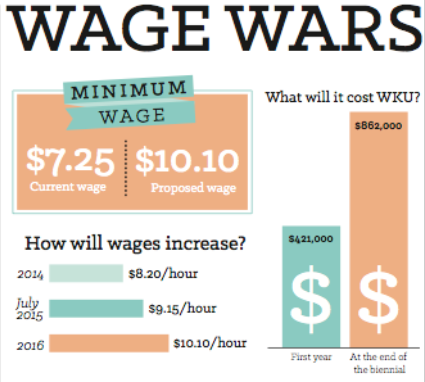Wage Wars: Minimum wage bill increases potential financial concerns
February 11, 2014
Kentucky’s minimum wage debate could affect WKU student workers and other university employees.
House Bill 1, sponsored by House Speaker Greg Stumbo, D–Prestonburg, seeks to raise minimum wage to $10.10 by 2016. The last time the minimum wage was increased was 2009.
If passed by the Senate, the bill would cost the university an estimated $421,000 the first year and an additional $862,000 at the biennial’s end, senior vice president for Finance and Administration Ann Mead said.
President Gary Ransdell said university officials are currently identifying how many student workers are on payroll to minimize student job loss.
“We don’t want to eliminate jobs in order to pay for the increase,” Ransdell said.
The additional cost to maintain student workers and other university employees on minimum wage compounds Gov. Steve Beshear’s proposed 2.5 percent budget cut to public universities, potentially leading to a $1.8 million loss for WKU.
Wages would increase incrementally during the fiscal biennial, increasing wages to $8.20 per hour this year, then to $9.15 per hour in July 2015 and $10.10 by 2016.
After nearly three hours of heated debate on the floor, the bill passed the House with a 54-to-44 vote last Thursday evening. The Republican-controlled Senate will begin reviewing the bill next week.
Robbin Taylor, vice president for Public Affairs, said the university will continue to track the bill, as well as Beshear’s budget proposal.
“We are obviously interested and monitoring it because of the financial impact for which we will need to plan,” she said in an email.
The average minimum wage worker in Kentucky currently earns around $15,080 a year, Stumbo said. If passed, the bill would raise that number to $21,008.
Full-time enrolled WKU students pay $8,722 in tuition and fees per year, according to the WKU tuition and fees schedule. If the Kentucky Council on Postsecondary Education allows for a 4 percent increase in tuition, WKU students would add another $350 to their current tuition, paying nearly $9,071 in tuition and fees per year.
Ransdell said even a tuition increase wouldn’t solve a number of budgetary woes currently faced by the university.
Florence senior Emily Kemp works at the WKU bookstore. Although the history and social studies major makes more than minimum wage, she said her salary wouldn’t be enough to pay for college.
“I believe they [the university] should do what’s in the best interest of their students and faculty, whether that’s cut funding or cut students’ jobs,” she said. “A mix of both will probably happen. At the bookstore, I know we are constantly examining hours for employees and budget, and they are very conscious of that and use their funds and employees efficiently.”
Bowling Green junior Shannon Lay, a middle school math/science and math education double major, works in the math tutoring lab at the current minimum wage of $7.25 per hour.
“I’d love some extra cash in my pocket, but I’d be worried about losing my job,” the middle grades math major said. “I don’t think the university would want to keep so many student workers if they have to pay them so much more.”




















![Students cheer for Senator at Large Jaden Marshall after being announced as the Intercultural Student Engagement Center Senator for the 24th Senate on Wednesday, April 17 in the Senate Chamber in DSU. Ive done everything in my power, Ive said it 100 times, to be for the students, Marshall said. So, not only to win, but to hear that reaction for me by the other students is just something that shows people actually care about me [and] really support me.](https://wkuherald.com/wp-content/uploads/2024/04/jadenmarshall-600x422.jpg)



